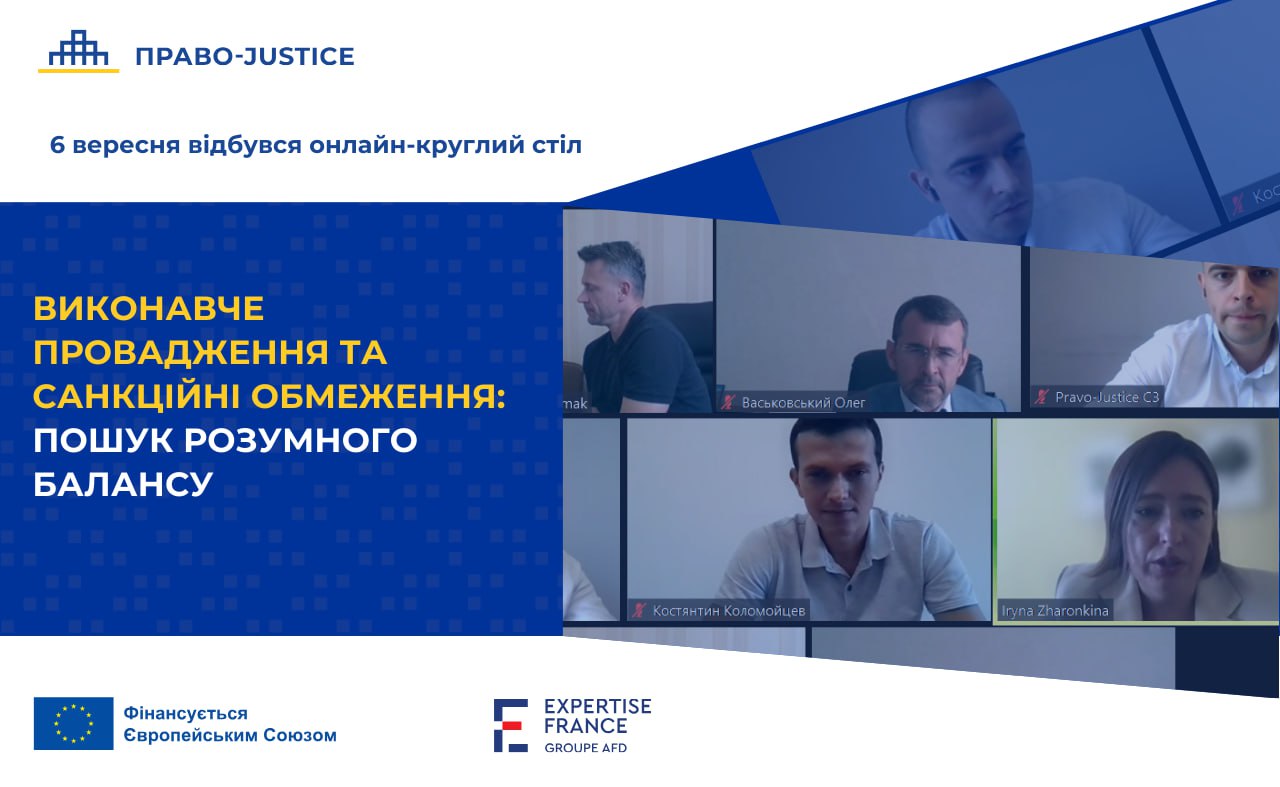EU Project “Pravo-Justice” held an online roundtable “Enforcement Proceedings and Sanctions: Striking a Reasonable Balance”

On September 6, EU Pravo-Justice Project held an online roundtable discussion “Enforcement Proceedings and Sanctions: Striking a Reasonable Balance”. Members of Parliament, representatives of the Ministry of Justice of Ukraine, judges of the High Anti-Corruption Court and justices of the Supreme Court, the National Security and Defence Council, the National Bank of Ukraine, members of the Ukrainian private enforcement community, legal practitioners and business representatives were invited to participate in the event.
“Since the war broke out, the sanctions portfolio in Ukraine has expanded significantly and is constantly evolving. Today we would like to discuss the practical aspects of sanctions in enforcement proceedings – when sanctions are applied to the debtor, the collector or both parties to the proceedings, and to discuss the balance between imposing restrictions and the principle of binding nature of the court decision,” said Iryna Zharonkina, Property Rights and Enforcement Component Lead of EU Pravo-Justice Project, in her welcoming remarks.
Oleh Mykhaliuk, Key National Expert of EU Pravo-Justice Project, said that since the beginning of the full-scale war, more than 20,000 personal special economic and other restrictive measures have been imposed on individuals and legal entities. Quite often, persons subject to sanctions may be parties to enforcement proceedings.
“Our research focused on issues related to opening enforcement proceedings involving persons subject to sanctions, taking enforcement actions against such persons, issues related to the acquisition of property, and the award of funds,” said Oleh Mykhaliuk.
While presenting the findings of the study, Kostiantyn Kolomoitsev, EU Pravo-Justice Project expert, Head of the Private Enforcement Officers Association Secretariat, focused on the conflict of legislative provisions on sanctions and enforcement proceedings. He emphasised that the sanctions legislation is structured in such a way that it prevails over other legislative acts (in particular, other laws are valid only to the extent that they do not contradict the law on sanctions). At the same time, the enforcement officer shall be guided in his/her activities by the Law of Ukraine “On Enforcement Proceedings”, which provides that the fact that sanctions have been imposed is not a ground either for refusing to initiate enforcement proceedings or for lifting the seizure of the property/funds of the sanctioned person or for terminating the enforcement proceedings.
“Existing conflicts of law should be resolved at the legislative level rather than through explanations or information letters. Enforcement officers should receive a clear answer as to what they should do if a sanction is imposed on the debtor, the creditor or both parties to the enforcement proceedings at the same time,” Kostiantyn Kolomoitsev said.
He also said that in the course of the study, the challenges arising in enforcement proceedings when the debtor or creditor is subject to such sanctions as: freezing assets, seizing assets for the benefit of the state, suspending enforcement of economic and financial obligations, full or partial prohibition of transactions with securities issued by persons subject to sanctions, prohibition of land acquisition were analysed in detail. Moreover, Kostiantyn Kolomoitsev shared five practical cases where the parties to the enforcement proceedings were persons subject to sanctions.
As part of the study, the experts analysed the regulatory framework and jurisprudence regarding the enforcement of court decisions by persons subject to sanctions in the EU and common law countries.
Based on the findings of the study, the experts made five general conclusions:
- According to the approach being shaped in the EU, sanctions as such cannot restrict the administration of justice.
- The negative consequences of the sanctions should not be shifted from the person subject to sanctions to the creditor of such a person. Therefore, a mechanism should be envisaged to resolve the foreclosure of assets subject to sanctions in enforcement proceedings in favour of the collector under a court decision.
- The specifics of taking enforcement action if sanctions are imposed on the parties to the enforcement proceedings should be regulated by law and provide for “safeguards” against abuse of rights and make it impossible to withdraw assets.
- Courts should take into account the fact that a particular type of sanction has been imposed when deciding on debt collection or seizure of specific property.
- Certain categories of decisions should be enforced regardless of the moment when the sanction was imposed. The only peculiarity will be the obligation of the enforcement officer to notify the competent authority of the opening of enforcement proceedings and the actual recovery of assets from or in favour of the persons subject to sanctions.
While working on the recommendations, the experts provided a certain list of cases that do not require an extra court decision in order to ensure enforcement.
“It is not feasible to obtain a court’s permission to enforce a judgment when it is about small amounts of money in enforcement proceedings that will not affect the asset structure of the person subject to sanctions. The actual amount of such a sum should be determined after further consultations with stakeholders,” said Oleh Mykhaliuk.
According to him, decisions on socially sensitive cases, such as alimony and compensation for damage to health, should also be exempted. Court decisions on the recovery of funds from the person subject to sanctions for the benefit of the state budget, local budgets or state-owned enterprises or companies where the state owns 50% of the shares or more should also be automatically enforced.